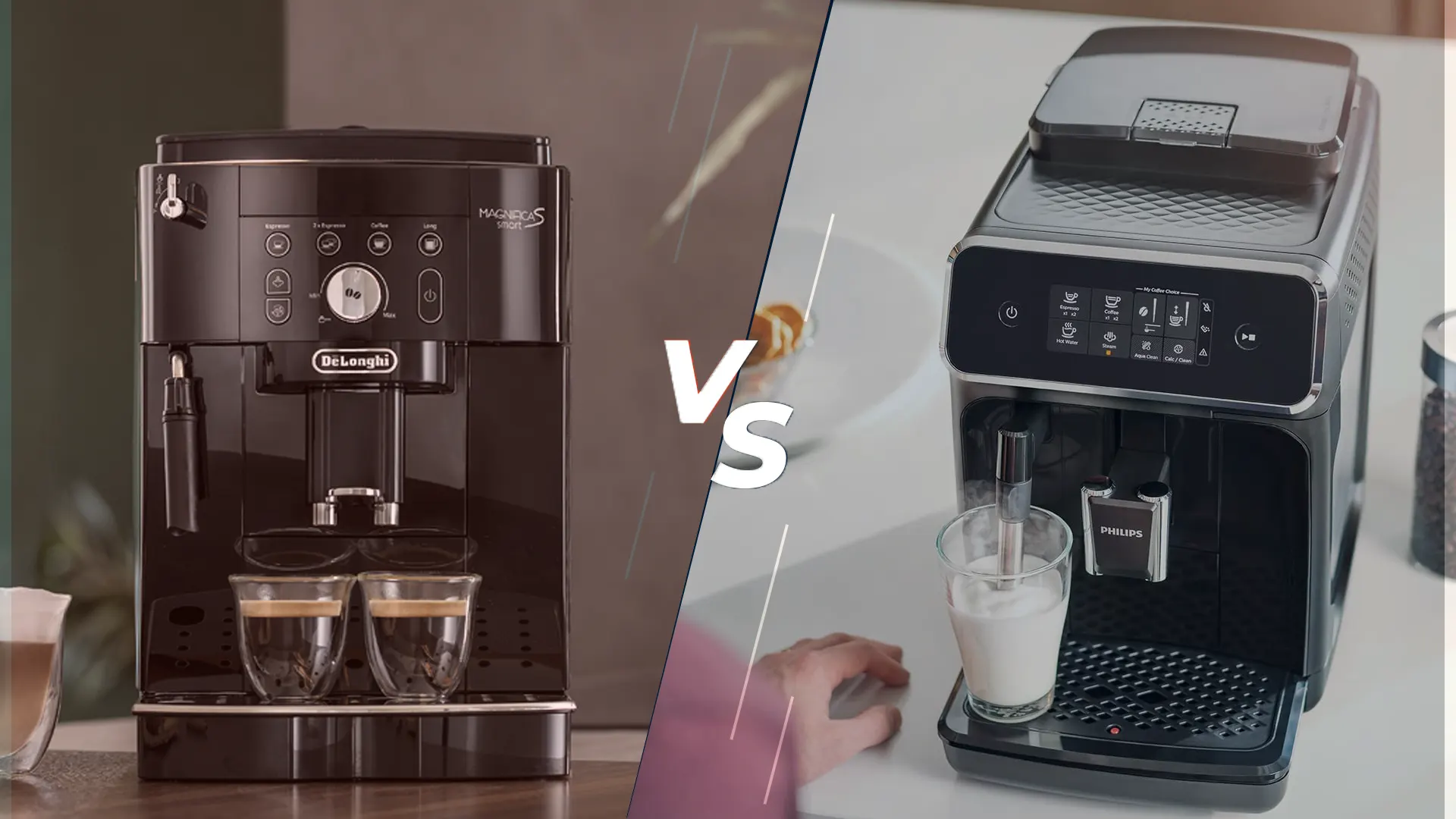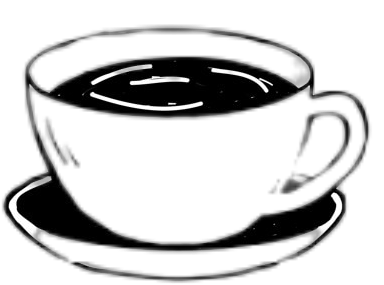#1: DeLonghi Magnifica EVO

- Simple and intuitive controls
- Built-in grinder for fresh coffee
- Compact and sleek design
#2: Philips 3200

- Easy to use
- Affordable
- Compact design
As a coffee lover who enjoys experimenting with different brewing methods, I’ve always been on the lookout for an espresso machine that strikes the perfect balance between quality, ease of use, and customization. The De'Longhi Magnifica Evo and Philips 3200 Series both promised to deliver exceptional coffee experiences, but after personally testing both, I found the De'Longhi Magnifica Evo to be a standout option for my daily coffee needs.
Initial Setup: De'Longhi Magnifica Evo vs. Philips 3200
Setting up the De'Longhi Magnifica Evo was a seamless experience. From unboxing to brewing my first cup, the process was straightforward and user-friendly. The clear instruction manual and intuitive interface made it easy to get started. The Philips 3200 Series also offered a relatively smooth setup process, but I found the De'Longhi's design and guidance more accessible, particularly for someone new to using fully automatic espresso machines.
Espresso Quality: A Closer Look at the Results
Espresso quality is where the De'Longhi Magnifica Evo truly shines. The 15-bar pressure system ensures a perfect extraction every time, delivering a rich, crema-topped espresso that rivaled the quality I’ve experienced in specialty coffee shops. With the ability to adjust the grind size and strength, I could fine-tune the flavor profile to match the specific roast I was using.
The Philips 3200 Series also produced good espresso, but it lacked the depth and complexity that I achieved with the De'Longhi. While it’s sufficient for casual coffee drinkers, the subtle nuances that make espresso special felt more pronounced with the De'Longhi.
Milk-Based Drinks: Cappuccinos and Lattes
As a fan of cappuccinos and lattes, the milk frothing system played a huge role in my decision. The De'Longhi Magnifica Evo’s manual steam wand gave me full control over the frothing process, allowing me to create silky microfoam that elevated my homemade drinks. It felt rewarding to master the art of frothing milk to the perfect texture, and the machine’s consistent performance made it easy.
The Philips 3200’s LatteGo system is undeniably convenient. It eliminates the need for a steam wand, which is great for those who prefer a hands-off approach. However, the texture of the froth was less consistent, and I missed the ability to customize the frothing process to suit specific drinks.
Everyday Usability: Living with the De'Longhi Magnifica Evo
After weeks of daily use, the De'Longhi Magnifica Evo became an essential part of my morning routine. Its quick heat-up time and one-touch options meant I could have a fresh espresso or cappuccino ready in minutes. Cleaning the machine was also hassle-free, thanks to its removable brewing unit and intuitive descaling alerts.
While the Philips 3200 Series was similarly convenient, I found its reliance on pre-programmed settings slightly limiting. The De'Longhi’s ability to customize drink temperature, strength, and volume provided more versatility, allowing me to experiment and refine my coffee recipes over time.

Who Should Consider the De'Longhi Magnifica Evo?
If you’re someone who values control and customization in your coffee-making process, the De'Longhi Magnifica Evo is an excellent choice. It caters to coffee enthusiasts who enjoy tweaking every detail to create their ideal cup, whether it’s a robust espresso shot or a creamy latte. The manual steam wand is particularly appealing for those who want to hone their barista skills at home.
The Philips 3200 Series, on the other hand, is better suited for individuals who prioritize convenience and are less concerned with hands-on control. Its simplified interface and LatteGo system make it a good option for those who prefer a quick, no-fuss coffee experience.
Additional Considerations: Noise, Space, and Aesthetics
For anyone living in a shared space, noise levels can be a significant consideration. The De'Longhi Magnifica Evo operates with relatively low noise, even during grinding and brewing. This was a huge plus for me, especially during early mornings when I didn’t want to disturb others. The Philips 3200 Series, while not excessively noisy, was noticeably louder during operation.
In terms of size, both machines are compact enough to fit on most countertops without dominating the space. The De'Longhi’s sleek and modern design complemented my kitchen décor, while the Philips 3200’s build felt more utilitarian.
Long-Term Maintenance and Durability
One of my concerns with any espresso machine is long-term reliability. The De'Longhi Magnifica Evo feels solidly built, with durable components that inspire confidence. Its removable parts, such as the brew unit and drip tray, make cleaning and maintenance straightforward, which is crucial for extending the machine’s lifespan.
The Philips 3200 Series also offers decent durability, but its reliance on more plastic components gave me some pause about its longevity. Over time, I suspect the De'Longhi would better withstand regular use.
Value Proposition: Why De'Longhi Magnifica Evo Stands Out
At first glance, the De'Longhi Magnifica Evo may seem like a pricier investment compared to the Philips 3200 Series. However, the additional cost is justified by the enhanced espresso quality, customization options, and overall user experience. It’s a machine that grows with you, offering more as you become more comfortable experimenting with different drinks and settings.
The Philips 3200 Series is a solid entry-level choice, but for those willing to invest a little more, the De'Longhi Magnifica Evo delivers a premium experience that feels well worth the price.

Final Thoughts: Why I Prefer the De'Longhi Magnifica Evo
Reflecting on my experience with both machines, the De'Longhi Magnifica Evo emerged as the better fit for my coffee habits and preferences. Its superior brewing performance, customizable features, and robust build quality made it a joy to use daily. Whether I wanted a quick espresso or a more elaborate milk-based drink, it delivered consistently excellent results.
While the Philips 3200 Series has its merits, particularly for those who value simplicity and convenience, the De'Longhi Magnifica Evo offers a level of craftsmanship and attention to detail that sets it apart. For anyone looking to elevate their home coffee experience, it’s a machine I can wholeheartedly recommend.
Frequently Asked Questions: De'Longhi Magnifica Evo vs Philips 3200
1. What is the difference in brewing quality between the De'Longhi Magnifica Evo and the Philips 3200?
The De'Longhi Magnifica Evo produces a richer, more full-bodied espresso thanks to its 15-bar pressure system and customizable grind settings. The Philips 3200 Series, while delivering good espresso, does not offer the same depth of flavor or control over the grind, making it less customizable for more discerning coffee lovers.
2. Which machine is easier to clean: the De'Longhi Magnifica Evo or the Philips 3200?
Both machines are relatively easy to clean, but the De'Longhi Magnifica Evo has a more streamlined cleaning process. It features a removable brewing unit, which simplifies maintenance. The Philips 3200 Series, with its LatteGo milk system, also offers easy cleaning, but the milk container requires more attention to avoid milk residue buildup.
3. Does the De'Longhi Magnifica Evo have a milk frothing system?
Yes, the De'Longhi Magnifica Evo has a manual steam wand for frothing milk, which allows you to create the perfect microfoam for cappuccinos and lattes. The Philips 3200 Series, on the other hand, uses the LatteGo system, which is automatic but produces a slightly less consistent froth.
4. Can I customize the coffee strength and temperature with both machines?
Yes, both machines offer some customization options, but the De'Longhi Magnifica Evo provides a higher level of control. You can adjust not only the coffee strength but also the temperature and volume of your drinks. The Philips 3200 Series offers some customization but with fewer options, especially in terms of temperature and volume.
5. Which machine is better for a beginner?
The Philips 3200 Series is a better choice for beginners. It has a simpler interface and more automated features, making it easier to use for those new to espresso machines. The De'Longhi Magnifica Evo, while user-friendly, offers more complex features and manual control, which might be overwhelming for someone just starting out.
6. Is the De'Longhi Magnifica Evo worth the extra cost over the Philips 3200?
If you’re looking for a more customizable and high-quality coffee experience, the De'Longhi Magnifica Evo justifies its higher cost. It delivers better espresso, more control over your drinks, and superior build quality. The Philips 3200 is a great entry-level machine, but the De'Longhi offers a premium experience that is worth the investment for coffee enthusiasts.
7. Which machine is quieter during operation?
The De'Longhi Magnifica Evo is quieter than the Philips 3200. It operates with minimal noise during grinding and brewing, making it more suitable for quieter environments. The Philips 3200 produces slightly more noise, particularly during grinding.
8. Do both machines offer energy-saving features?
Yes, both the De'Longhi Magnifica Evo and the Philips 3200 have energy-saving features. The De'Longhi model includes an automatic shut-off feature, which helps conserve energy when the machine is not in use. The Philips 3200 also has energy-saving capabilities, but the De'Longhi's proactive energy-saving functions stand out.
9. How long does it take for both machines to heat up?
Both machines have relatively quick heat-up times, but the De'Longhi Magnifica Evo heats up slightly faster, typically within 30 seconds. The Philips 3200 Series takes a bit longer, around 40 seconds to a minute, depending on the specific settings.
10. Which machine is more durable?
The De'Longhi Magnifica Evo is built with more durable materials, offering a more solid and long-lasting construction. The Philips 3200 Series, while still robust, relies more on plastic components, which may wear down faster over time compared to the De'Longhi’s more premium build quality.
